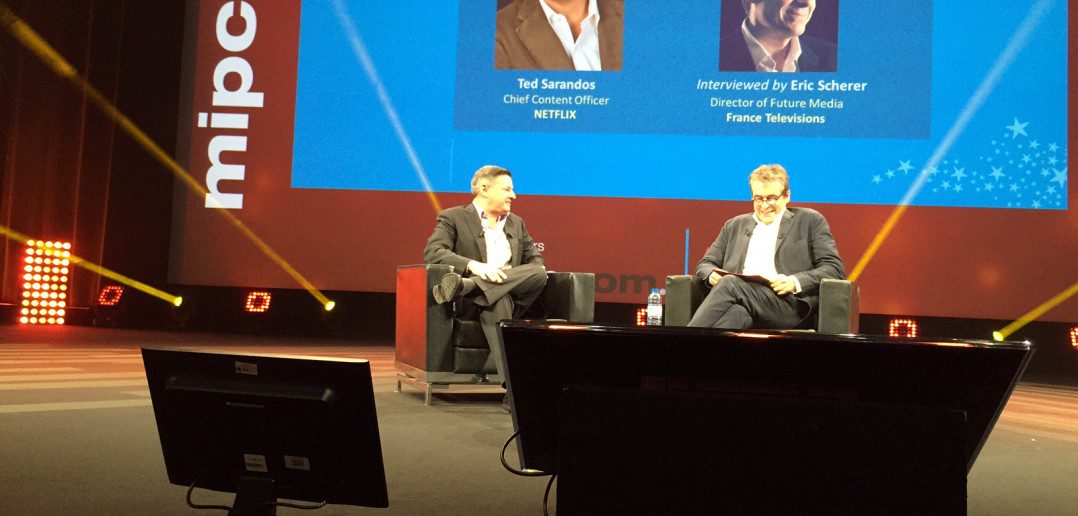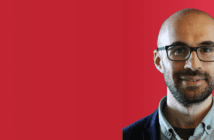MIPCOM’s run of keynotes today started with a big-hitter: Netflix chief content officer Ted Sarandos. Having led content acquisition for the company since 2000, he has a sharp eye on wider trends around digital services and content production, as well as his own firm’s growing clout within the television industry. Sarandos was interviewed by Eric Scherer, director of future media at France Televisions.
The figures are certainly impressive: more than 50m Netflix members, and a slate of original shows that now includes House of Cards, Orange Is the New Black, Lilyhammer and Hemlock Grove, with Marco Polo to come this December. Meanwhile, the company has been expanding aggressively in Europe, including the UK, Ireland, France, Germany, Austria, Switzerland, Belgium, Luxembourg, Denmark, Finland, Norway, Sweden and the Netherlands.
“I think it’s the golden age of storytelling,” he said, pointing to a tipping point in the US this week: the last mainstream channel to stop showing children’s programming on Saturday mornings. “The people at home are on-demand viewers. They get content when they want it.”
Sarandos declined to talk about figures for Netflix’s recent European launches, since the company’s latest financial results are about to be announced. He was positive about the impact though, saying watch times have matched existing markets. “Unsurprisingly Orange is the New Black is the most-watched show in France and Germany in the first few weeks, and we’re excited about that, because the show has not been previously available in those markets,” he said. ”
Netflix tends to launch with a relatively focused catalogue, then expands it based on what people are watching in each market. “When we launch, we launch with about half the programming that that territory will have in about 12 months,” said Sarandos. “What you see in our launch is… we have a pretty good handle on the market based on everything without operating there… but the programming from after the launch and for the first 12 months mostly reflects that market’s viewing behaviour.”
Sarandos talked about Netflix’s focus on technology: “When you push play, it works, and that’s something we’ve been working on for nine years.”
And he talked about Netflix’s plans for original French content: it’s working on a series called Marseille that will debut towards the end of 2015, but Sarandos said that the company has found large audiences for existing French content around the world already: in other words, as a commission, Marseille didn’t only have France in mind. “Beyond our production of Marseille, we are also working with French animation houses for coproductions,” he said.
The company is moving from being a distributor to a programmer – from an online store to a TV channel, suggested Scherer. “The content that you have on Netflix, we want for the consumer for it to be just another channel,” he said. “It’s a destination for your ability to choose, and for your ability to enjoy it on your own timetable… we’re not a very narrow-demographic programmer… we are programming for the world.”
Netflix recently commissioned its first five films, including the sequel to Crouching Tiger Hidden Dragon, and a slate of Adam Sandler movies. “We do want to be more active in this. The current distribution model for movies in the US particularly, but also around the world, is pretty antiquated compared to the on-demand generation we’re trying to serve,” he said, suggesting that the old model of OTT services like Netflix having to wait for years to get films from traditional studios is dating fast. “We want to put our money where our mouth is, and we’ll fund the movies to make it work… About a third of the watching on Netflix is movies, so for us it’s just content… House of Cards is a 13-hour movie or a 26-hour movie!”
He talked about how “very regional television shows are finding global audiences on Netflix”, and said that the company is looking for “unique voices that are looking for a larger platform” within the independent production community. “We’re looking for great storytelling of all sizes,” he said, before returning to Sandler, whose films will be released straight to Netflix, with no cinematic releases. “Adam is one of the few real movie brands in Hollywood, which is why we’re so excited to do that with him.”
Scherer asked about the balance between Netflix’s data analytics and its editorial judgement. “There’s a misunderstanding about our analytics, that we somehow use the data to craft programming. This is completely inaccurate. We use the data to determine the potential size of the show,” he said, referring back to House of Cards, where data influenced the size of the budget that Netflix committed to the project, but did not influence the actual content at all.”
Is Netflix a co-producer or just a big buyer of rights? “Both,” said Sarandos. Sometimes it comes in at a script level and owns the show “top to bottom”, while other times, it’s buying in shows to find them an audience elsewhere in the world. But the conversation turned to genres, including its deal with Chelsea Handler to make a talk-show.
“Most late-night television in the US is rarely watched late at night. People are watching online and time-shifting,” he said. “People are typically watching the sketch or the joke or the moment that everybody’s talking about the next day.” So Handler’s show will have a lot of sketches and comedy, but won’t look like her previous talk show. “We’ll move away from the gossip of the E! show and more lean on the things that Chelsea’s really great at, which is telling stories and making us laugh.”
Will Netflix get into live sports or news? Not for now. “The on-demandness of Netflix is what makes it special,” he said. “I don’t think we bring anything special to sports and news… If we can figure out how to do something different with news, that would be interesting… I wouldn’t rule out anything. I would have ruled out many of the things we’re doing today years ago!”
What is Netflix doing with 4K-quality content? “It’ll be great. The advancements in compression will be able to deliver 4K just fine with current broadband speeds. We have House of Cards, we have Breaking Bad, we have Blacklist… the 4K library has grown dramatically. All of our original series are being shot in 4K, and certainly our original features. It will completely invert people’s expectations of quality of content on the internet.”
And finally, trends? “The move toward consumer choice is the underlying one. There’s a lot of business models that thrive on controlling dissatisfaction. Releasing one episode a a time on linear television for scripted TV will, I think, soon be a thing of the past,” he said. Even for networks, as they develop their digital strategies. “It will be fairly routine at some point, and I wouldn’t be surprised to see that happen as early as next year.”




